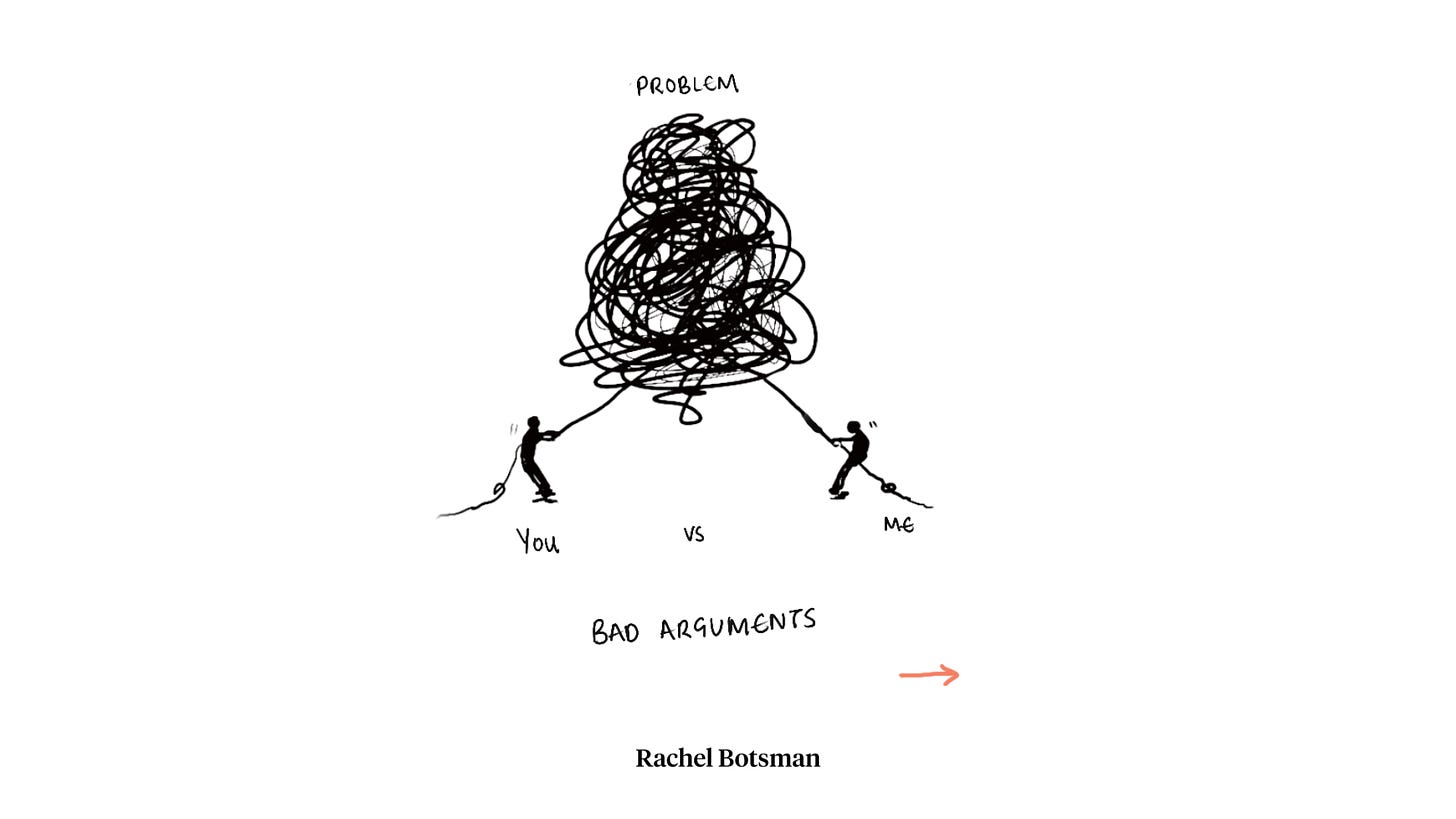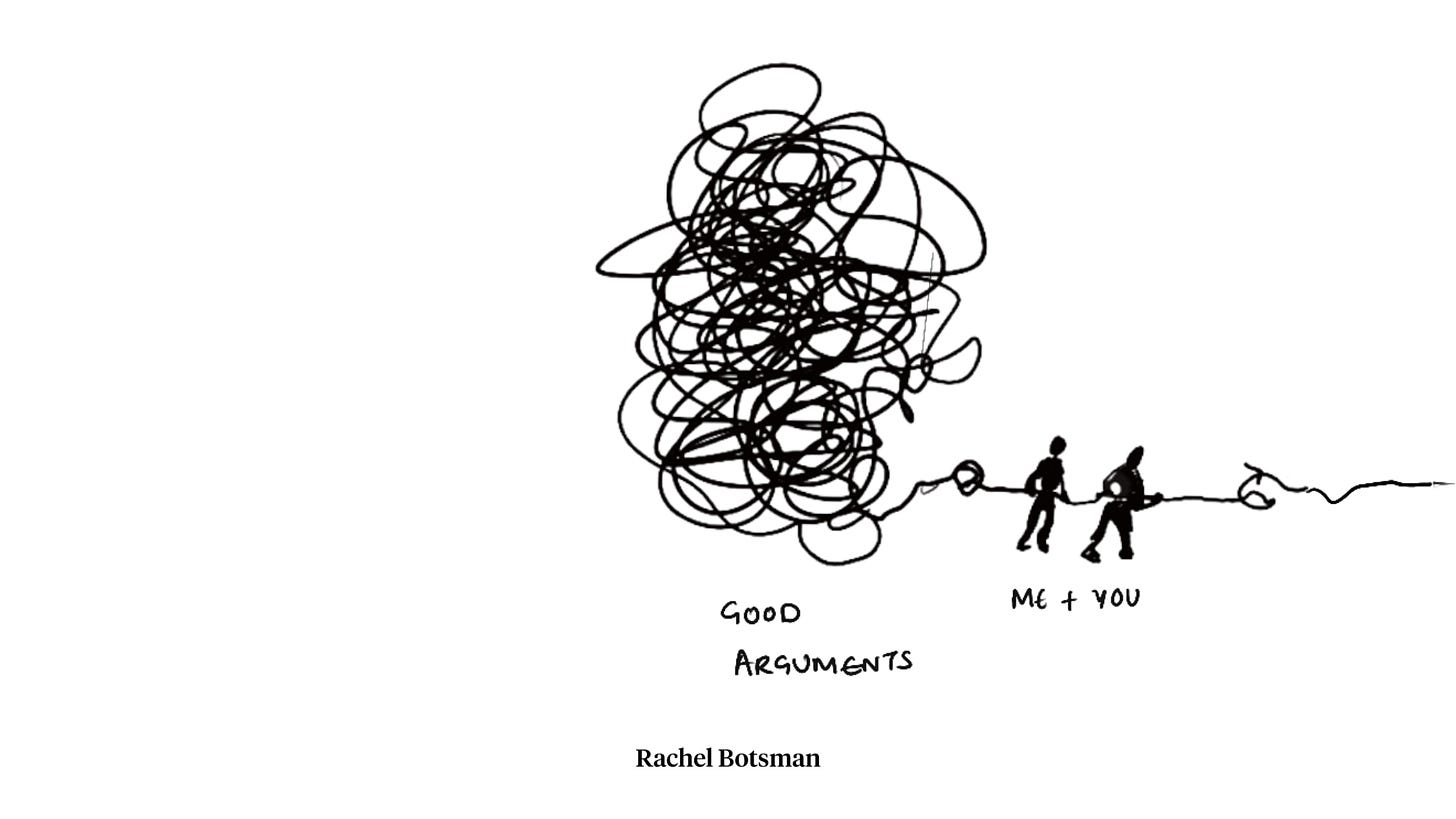Guest Post by Rachel Botsman | How to Have Productive Arguments
This is a guest post by WWSG thought leader Rachel Botsman, originally posted here.
How can you disagree well?
My 11-year-old son loves to argue. Or I should say debate? He loves to tear apart ideas – typically not his own. I think it’s brilliant that he has the confidence to disagree but lately, I realised he didn’t know how to argue well. It really bothered me, and I wanted to help him.
It got me thinking about how often we disagree at work and the importance of learning better ways to argue. That’s why this week we’re rethinking arguments.
When you think of an argument, what comes to mind?
There are lots of different forms of arguing and disagreement in our lives. Maybe you thought of a…
- Political debate with leaders posturing at each other
- A tense argument around the family dinner table
- Bickering with your partner, kids, or a friend.
- Or, perhaps, a polarised spat on Twitter.
Bad or sloppy arguments surround us. According to a recent study of over 2,000 people, the average American household will see 217 arguments a year – just over the dishes! And as we’ve probably all experienced, they’re not really about the dishes.
It often feels like we’re living in a Monty Python sketch where arguments feel like exasperated exchanges of “yes I did” and “no you didn’t.”

Running away from conflict aversion
When I thought about my relationship to arguments, I realised how often I avoided arguments period because I don’t like the feeling of conflict. I’d rather people please.
It’s easy to see how we end up running away from arguments as adults. Books such as How to Win Friends and Influence People, the seminal work (I’m not a fan but) by Dale Carnegie said:
“There is only one way to under high heaven to get the best of an argument
– and that is to avoid it.”
But was Carnegie recommending complacency or agreeableness?
In many ways, it’s easier to just be agreeable in everyday life. It avoids having to worry about hurting other people’s feelings. It keeps us safe from offending someone. It avoids something we say being taken out of context and being used against us. It keeps the peace and is polite, or is it?
If you want to think differently about arguments (or how to help others to argue better), I highly recommend reading Bo Seo’s new book, The Art of Disagreeing Well. As the two-time world champion of debating, he clearly knows a lot about good arguments and how they can improve our lives.
The book helped me see that there are common problems with the way people argue including:
- Pushing back without offering any alternative.
- Not knowing when to stop (a big one.)
- Thinking of an argument as a two-sided you vs me.
- Hating losing an argument (often out of fear of looking stupid)
- And not properly listening to what the other side is saying.
We’re taught how to express ideas, but there is a craft to disagreeing well that we never learn unless we’re a debater, professional negotiator, or lawyer. As Bo points out, “an argument is not just an expression of what you think.”

So, what is a good argument?
How we begin is important: not going in with the assumption the other side is going to agree with us by the end of the conversation. A good argument is when both sides feel like progress has been made on the problem.
From his debating experience, Bo has reduced an effective argument down to answering four W’s:
- WHAT is the argument you’re trying to make?
- WHY is it true?
- WHEN has it happened before?
- WHO cares?
Disagreements are an act of trust
In learning how not to hide what he really thought in debates, Bo recognised something powerful:
“Rebuttal was a vote of confidence not only in ourselves but in our opponents, one that contained the judgement that the other person was deserving of our candour and they would receive it with grace.”
Constructive arguments are a deep sign of trust. Too much agreeability can signify a lack of trust in another person, team, or culture.
Starting to see disagreement through the lens of trust is helping me to rethink some deep associations I had with arguments:
- Most arguments are always divisive or destructive
- What’s the point when most disagreement feels ineffectual
- By holding back or saying something neutral like ‘Mm-hmm, interesting,’ we’re being kind but not honest.
All of the above are based on assuming bad intentions about the other person.

Disagreement doesn’t have to be disagreeable
Being able to have a good argument with another person is a sign the relationship is secure, and you won’t easily offend them. You know when you’re in this place when you feel like both sides are in this together – arguing not to push against each other but to arrive at a different place.
It may sound like an oxymoron to have the words “benefit” and “argument” in the same sentence. However, research by Amy Edmondson, a professor of leadership at Harvard Business School, has shown how high psychological safety and trust enables people to disagree. And that friction can have enormous benefits for workplace cultures including:
· More productive conversations and better problem solving
· Personal learning and growth
· Earlier detection of issues and less unresolved tensions
My son has started reading Bo’s book and I can see some differences. He’s poking, probing, and pushing the boundaries but starting to think more about what argument he’s trying to make and why he cares.
So, here’s to recognizing the art of good arguments as work – a craft we can all get better at.

